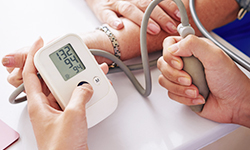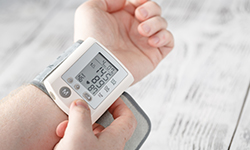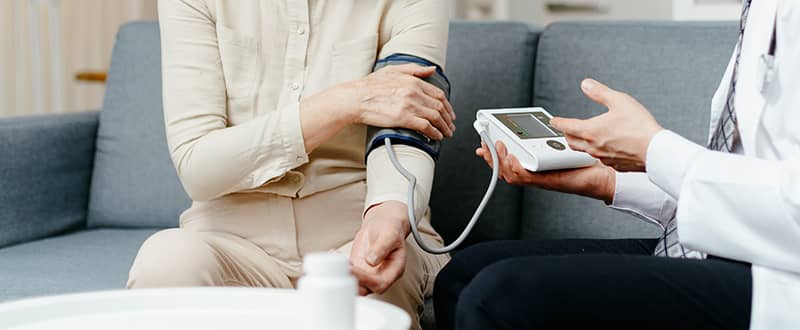Increased blood pressure is associated with a wide range of conditions. Hypertension (high blood pressure) is one of the most significant causes of death globally. To reduce the risk of severe illnesses and prevent morbidity, you must monitor your blood pressure regularly. This is particularly important for people with pre-existing cardiac conditions, kidney diseases, and other lifestyle conditions like diabetes.
Apart from regular monitoring, you must ensure that your blood pressure readings are accurate. This is because it is a significant parameter that assesses your cardiovascular health, and any abnormal reading may be a sign of an underlying problem. For example, underestimating the actual blood pressure by 5mm Hg could wrongly label a patient with prehypertension when they may, in reality, be hypertensive. Also, overestimating accurate blood pressure by 5 mm Hg can lead to inappropriate treatment with medications.
Reasons for Inaccurate Blood Pressure Monitoring

There can be many reasons why your blood pressure levels may be recorded inaccurately. Some of the common ones include:
- When the blood pressure device (sphygmomanometer) cuff is tightened over clothing
- When the cuff is too small for the patient
- The arm is above or below heart level
- Legs are crossed
- When the back and feet of the patient at the time of recording are not supported
- The patient did not rest for 3-5 minutes before measurement
- The patient is talking during blood pressure recording
Another common cause for inaccurate blood pressure readings is a visit to your doctor. Most people get anxious or stressed when they visit their doctor. So, in many cases, when their blood pressure is recorded in the doctor’s office, it tends to be on the higher side. This is called White Coat Hypertension. Regular blood pressure monitoring at the doctor’s clinic can result in a patient being termed hypertensive. To avoid this, doctors today recommend monitoring blood pressure at home for better hypertension management.
Monitoring Blood Pressure at Home

Monitoring blood pressure at home is increasingly being incorporated into treatment and management plans of patients with hypertension. There are many advantages cited for this trend, which include:
- Better control of blood pressure
- Ability to monitor blood pressure 24×7
- Advanced and easy-to-use blood pressure recording devices for home use are available.
- Cheaper than a regular doctor visit
- Reduces chances of White Coat Hypertension
However, there have been multiple reports of Ambulatory BP Monitoring devices providing inaccurate readings. Therefore, it is best to consult your doctor before buying a home BP monitoring device.
Effective Hypertension Management

One of the critical things to do while managing your hypertension is regular and accurate BP monitoring. Lifestyle changes are instrumental in keeping your blood pressure under check. Here are some handy and practical tips that can keep your numbers within check and help you live an everyday life:
- Eat a healthy balanced diet that is low on salt.
- A DASH diet is recommended for people with hypertension
- Getting a minimum of 45-minutes of exercise every day that involves running, jogging, brisk walking, or other cardio workouts
- Maintaining a healthy weight
- Limit alcohol consumption
- Quit smoking
- Opting for stress management techniques like yoga, meditations, etc.
In many patients, just lifestyle changes are not effective in reducing their blood pressure readings. In these patients, anti-hypertensive medications may be prescribed to lower their blood pressure.
If you are on anti-hypertensive medications, you must continue taking them until your doctor advises you to stop or changes your medications. Unfortunately, it is common to hear people telling you how to reduce blood pressure with just diet and exercise or opt for non-allopathic treatments wholly and only stop your doctor-prescribed medications. However, it is highly recommended not to heed such advice as this can prove dangerous for your health and life.
Takeaway!
Hypertension or high blood pressure is a common chronic lifestyle condition among the old and the young today. However, being diagnosed with hypertension is not the end of the world. With the proper diet, exercise routine, other lifestyle modifications, regular home BP monitoring, and anti-hypertensive medications, you can successfully bring down your blood pressure and maintain it within the optimum range. However, despite the advances in home BP monitoring devices and doctors’ recommendations of self-monitoring of blood pressure, you must visit your doctor from time to time to allow them to evaluate your condition clinically.
There may be many near and dear ones who may be hypertension patients too. However, avoid listening to unsolicited advice from anyone but your doctor. Since the cause of high blood pressure and its effects may be different in everyone, the medications prescribed may also differ. It is, therefore, recommended not to stop or change your medicines without your doctor’s advice.
Note of caution: This article is for information purposes only. Always consult your doctor in case of any blood pressure or other health-related problems.
Disclaimer
The information contained in this article is to educate, spread awareness in relation to hypertension and other diseases to the public at large. The contents of this article are created and developed by BPinControl.in through its authors, which has necessary, authorisations, license, approvals, permits etc to allow usage of this articles on The Website. The views and opinions expressed in this article are views, opinions of the respective authors and are independently endorsed by doctors. Although great care has been taken in compiling and checking the information in this article, The Website shall not be responsible, or in any way liable for any errors, omissions or inaccuracies in this article whether arising from negligence or otherwise, or for any consequences arising therefrom. The content of this article is not a substitute for any medical advice. The Website shall not be held responsible or liable for any consequence arising out of reliance on the information provided in the article.




